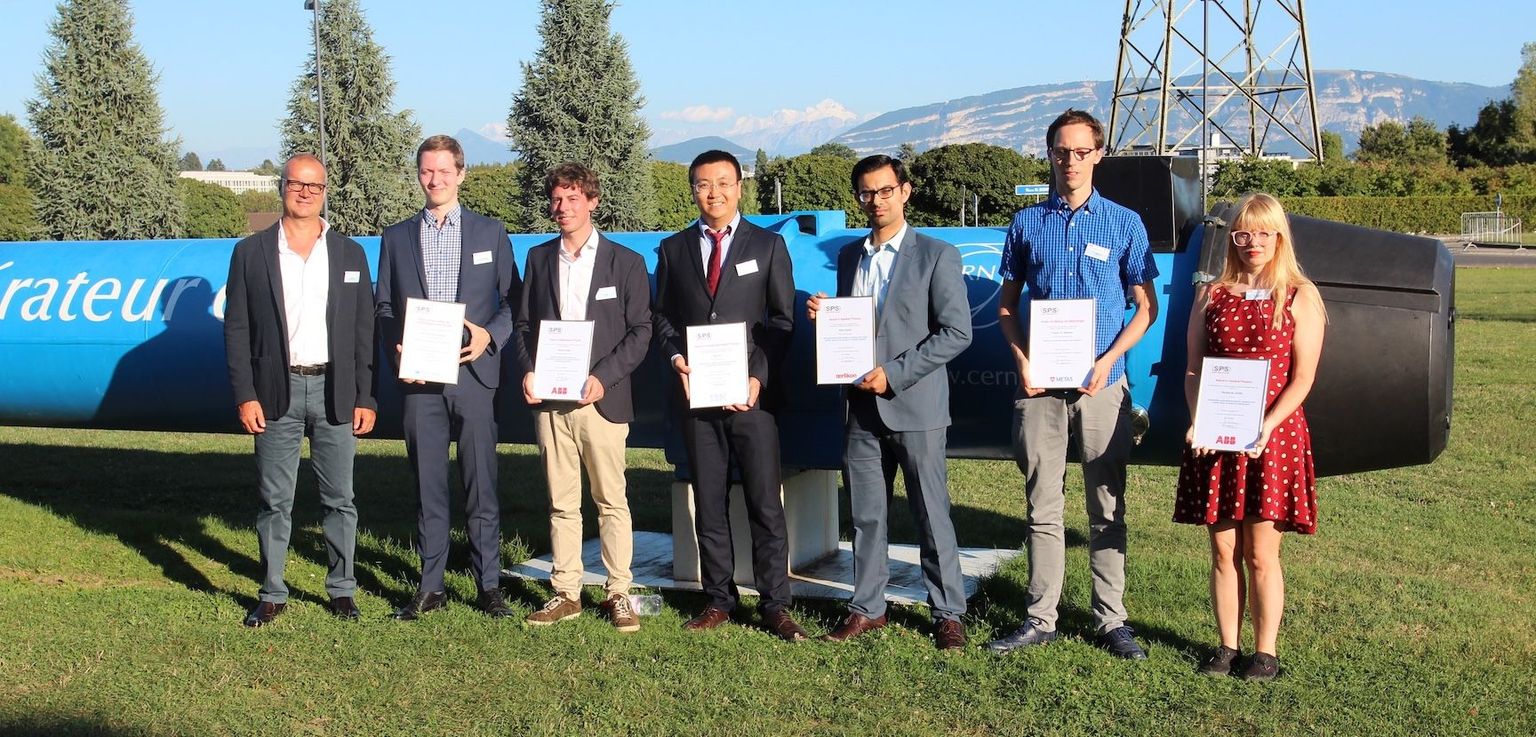Die Gewinner der SPG Preise 2017
Das SPG Preiskomitee unter der Leitung von Professor Louis Schlapbach wählte die Gewinner für 2017 aus zahlreichen Einreichungen aus.
Die Gewinner präsentierten ihre Arbeiten an der gemeinsamen Jahrestagung in Genf. Nachfolgend die Laudationes (geschrieben von L. Schlapbach) und Zusammenfassungen (geschrieben von den jeweiligen Autoren).
(Zur Zeit sind keine deutschen Übersetzungen verfügbar.)

Von links nach rechts: Carlo Sirtori, Gewinner des neu geschaffenen Charpak-Ritz Preises, Evert van Nieuwenburg, Patrick Hofer, Nan Xu, Waiz Karim, Fabian Natterer, Sinead M. Griffin
SPS Award in General Physics, sponsored by ABB
The SPS 2017 Prize in General Physics is shared by Sinead M. Griffin and Patrick Hofer.
Sinead M. Griffin is awarded for her extraordinary PhD work in computational physics bridging cosmology with condensed matter physics. Griffin identified that the multiferroic hexagonal manganites, with their coupled ferroelectric and structural phase transitions, exhibit the same symmetry properties as those proposed for the Grand Unification Transition, shortly after the Big Bang. She then exploited the physics of the structural phase transition in this crystalline solid to model the process of cosmic string formation in the early universe.
Patrick Hofer is awarded for his excellent PhD thesis entitled "Dynamic Mesoscopic Conductors: Single Electron Sources, Full Counting Statistics, and Thermal Machines", an original and internationally visible contribution to modern quantum physics, which he had started with the late Markus Büttiker and finished with Eugene V. Sukhorukov & Christian Flindt at the University of Geneva.
With mathematical skills and physical intuition he investigated the controlled emission and entanglement of individual electrons in mesoscopic circuits, the statistics of current fluctuations and electron waiting times for phase-coherent quantum transport and thermal machines at the nano-scale.
SPS Award in Condensed Matter Physics, sponsored by IBM
The SPS 2017 Prize in Condensed Matter Physics is awarded to to Nan Xu for his extraordinary postdoctoral work in experimental observation of Weyl semi-metals and topological Kondo insulators, two novel topological phases in condensed matter.
Using angle resolved photoemission spectroscopy at the Swiss Light Source he demonstrated the existence of Weyl nodes and Fermi arcs in TaP and could resolve the puzzle of different magneto-transport properties in transition-metal mono-phosphides which have similar fermi-arc states.
The results were published in best journals of physics with Nan Xu as 1st author and reached rapidly "highly cited" or "hot" paper standard (top 1%).
SPS Award in Applied Physics, sponsored by Oerlikon Surface Solutions AG
The SPS 2017 Prize in Applied Physics is awarded to Waiz Karim for his PhD thesis entitled "Metal nanostructures and their catalytic properties using top-down nanofabrication and single particle spectroscopy" which was honored with his 1st author publication "Catalyst support effects on hydrogen spillover" by W. Karim, C. Spreafico, A. Kleibert, J. Gobrecht, J. VandeVondele, Y. Ekinci, J. A. van Bokhoven, Nature, 2017, 541, 68–71. He pioneered work to combine nanofabrication & single-particle spectro-microscopy to visualize catalysis and achieved unprecedented precision in particle positioning and for the first time quantified spatial extent of 'Hydrogen spillover' to settle a 52 year old controversy. These achievements contribute to the fundamental understanding of the catalysis, essential to the development of sustainable processes.
SPS Award related to Metrology, sponsored by METAS
The SPS 2017 Prize related to Metrology is awarded to Fabian Natterer for his extraordinary postdoctoral work on the ultimate limits of the classical approach to high density magnetic storage media by a magnetically bistable Holmium atom; the work was recognized with his publication "Reading and Writing Single Atom Magnets" in Nature (March 2017, shared 1st authorship*) and highlighted in a Nature News & Views commentary. He demonstrated how to read and write the single Ho atom states using tunnel magnetoresistance and current pulses by a scanning tunnelling microscope. The Ho-atom magnetic moment was measured with unprecedented accuracy by dipole-dipole interaction with an electron spin resonance STM on nearby Fe-atom sensors.
*) „Reading and writing single-atom magnets“, F. D. Natterer, K. Yang, W. Paul, P. Willke, T. Choi, T. Greber, A. J. Heinrich, and C. P. Lutz, Nature (2017). DOI: 10.1038/nature21371
SPS Award in Computational Physics, sponsored by COMSOL Multiphysics GmbH
The SPS 2017 Prize in Computational Physics is awarded to Evert van Nieuwenburg for his PhD work entitled "Topology and Localization out of Equilibrium" in theoretical condensed matter physics. With his background in both computer science and theoretical physics, he introduced concepts from machine learning as very powerful methods in the toolbox of condensed matter physicists. He developed a new algorithm that allows to detect phase transitions solely based on "raw" numerical or experimental data, without any prior knowledge about the nature of the phases or transitions involved. Successful applications in topics like strongly-correlated non-equilibrium systems, disordered spin chains and quantum engineered systems such as photonic cavity arrays allowed publication in Nature Physics, February 2017 as 1st author with the title "Learning phase transitions by confusion", highlighted by accompanying "News & Views".